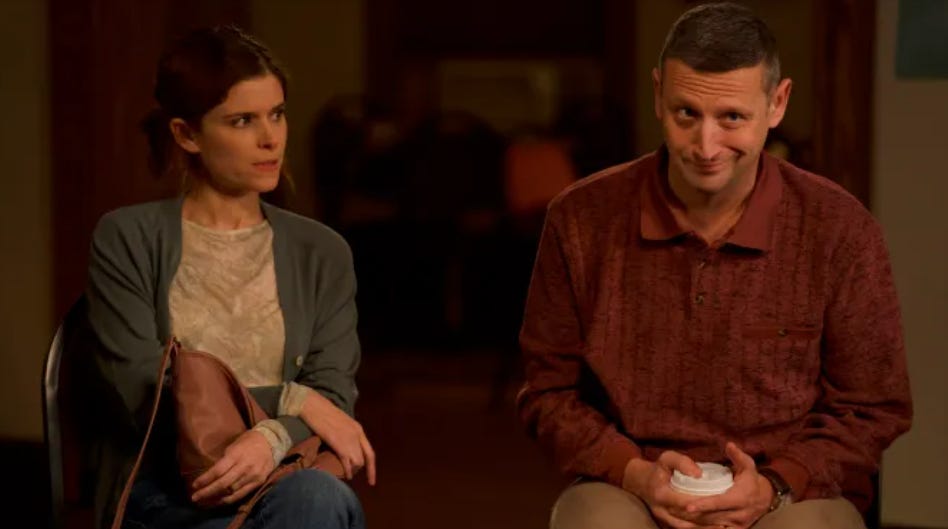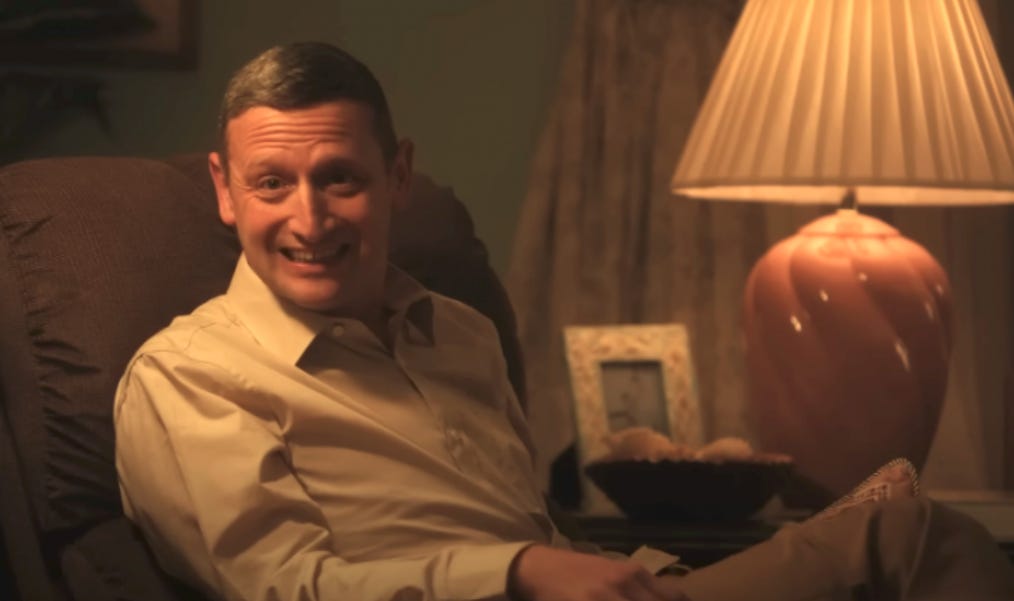009—Friendship
Instability, desperation, and violence ensue when a lonely man loses a 'friendship'
In the support group opening scene of Friendship we learn a lot about the rut Craig (Tim Robinson) and Tami (Kate Mara) are in. She’s one year into cancer remission, wanting to try new things like getting a minivan, and wondering whether she’ll ever orgasm again.
Putting it mildly, Craig seems a bit awkward and Robinson plays the role with the same sense of ‘hard-to-watch' yet hard-to-look-away’ cringe that he’s known for in his sketch comedy series I Think You Should Leave. Here, Craig is also oblivious to the disconnection that occurs when he dismisses Tami’s fears around her cancer returning one-day, and instead centers the belief that makes him feel comfortable even as it harms her.
While Tami is running a seemingly thriving floral business and has at least one friendship with her ex Devon (Josh Segarra), Craig’s life is frictionless and inert. He wears mostly beige clothes all ordered from one singular company, has no friends or nightly plans, no hobbies outside of catching the latest Marvel, and quite possibly no true sense of self.
His job—making products addictive by ensuring the experience off product creates extreme feelings of displeasure—drives the antisocial culture he is seemingly swimming along in. Aware of it or not, Craig has agency, but he seems more or less content with his eccentric, awkward existence and lack of social skills. That is of course, until he meets his new neighbor Austin (Paul Rudd).
A package delivered to the wrong house enables their bromance meet cute to take place. At first, Craig seems mystified and then slowly enraptured by Austin’s way of being and how different it is from his own. Austin is the type of guy who wears a bandana as an ascot, is in a band, says earnest parting lines like ‘Stay curious’, and has a male friend group of authentic, vulnerable ‘brothers’.
Someone couldn’t have engineered a better product for Craig to get addicted to, than friendship in the form of Austin. Does he even truly like Austin or does he like how he feels around Austin? Craig sees Austin as the epitome of cool, and because Austin is interested in hanging out with Craig, perhaps that means he too, while not quite cool, is worthy of connection. This is reflected in a fantasy Craig has where he casts himself as a hero being praised by Austin for securing wood and keeping what remains of civilization warm after an apocalyptic event. His narrative about this all: “I’m on the edge of life and the view is gorgeous.”
What Craig fails to realize through his haze of mimetic desire, is that Austin is not universally cool. Austin may be truer to himself than Craig, but his way of being, whether embodied or performative started as a construct to mask imperfections and insecurities. Instead of seeing Austin as human, Craig subconsciously turns Austin into an object of obsession, gets addicted to the connection, and inevitably guarantees a crash out.
Craig’s lack of connection means his social acumen is immature and stunted and that’s put on display when Austin invites him to a group hang. You can tell the stakes are high for Craig as he gives himself a pep talk about being himself. He’s able to play off an initial misstep of crashing into patio glass so hard it shatters, but not what comes next.
Craig insists on being able to play (box) and when hit is unable to differentiate between something that he isn't enjoying and needs more skill at versus an attack. He can't communicate in the way the men who are singing to one another do, and so when he reaches his limit (a third punch) he over reacts, lashes out sucker punch style, and knocks Austin out. The shame that causes him to self-denigrate through a bizarre soap-in-the-mouth punishment serves to illustrate how out of his depth this character is.
“You made me feel so free. You all accepted me way too fast. People need rules”—Craig upon being rejected
Naturally, Austin pulls back, but when Craig keeps trying to connect Austin cuts him off and from there Craig truly beings to unravel. Desperate for connection, Craig tries reverse engineer the experience of connection he had with Austin with others to no avail. He recreates the experience of mushroom foraging only to end up poisoned, he invites his coworkers over for a ‘guy’s night’ only to end up mocked (these men are secure enough in themselves and confident to call out the weirdness vs idolizing it, which is an idea that doesn’t even seem to cross Craig’s mind until it happens to him), he breaks into Austin’s house and steals his gun, and he attempts to recreate the sewer adventure with Tami only to end up losing her somewhere beneath the city.
A mistake that’s often made when going from inaction to action, is to assume that the act of doing guarantees an outcome. In actuality, agency opens a door. Change and difference may be on the other side, and sometimes the outcome you want, but it’s not always inevitable. Craig tasted manna, and no one can blame him for wanting to avoid returning to his former life of loneliness. But instead of grappling with the role he played in the disconnection, his lack of behavioral skills, and his ideas around entitlement, Craig chooses to hold Austin & Co. at gunpoint demanding they talk to him.
They’re all just objects that won’t bow to his desires and the outcome he desperately believes he’s entitled to but is also fundamentally insecure about being deserving of. Craig can’t face himself, or the vulnerabilities the friendship and rejection stirred up, and to mask his feelings of moral failure, the only outlet is a projection outward, “I did one thing wrong and you throw me out. Maybe you’re the bad guys.”
Movies this is in conversation with
Of an Age (here loneliness doesn’t lead to external violence, but the experience and then absence of an impactful romantic connection leads to a life put on pause in the hope in an impossible attempt to stay in that moment forever. Also it's one of my favorite movies of all time so I will link to it whenever I can)
Other movies watched this week
Boomerang, The Wedding Banquet (1993), The Wedding Banquet (2025), Parthenope, Bring Her Back, Stars at Noon, Mountainhead.







I look forward to reading your writing. I don't have an expectation of what I'm going to read but I always leave feeling satisfied with what I've read. This review was so good that I didn't remember it was you writing until I scrolled back up to the top of the screen.